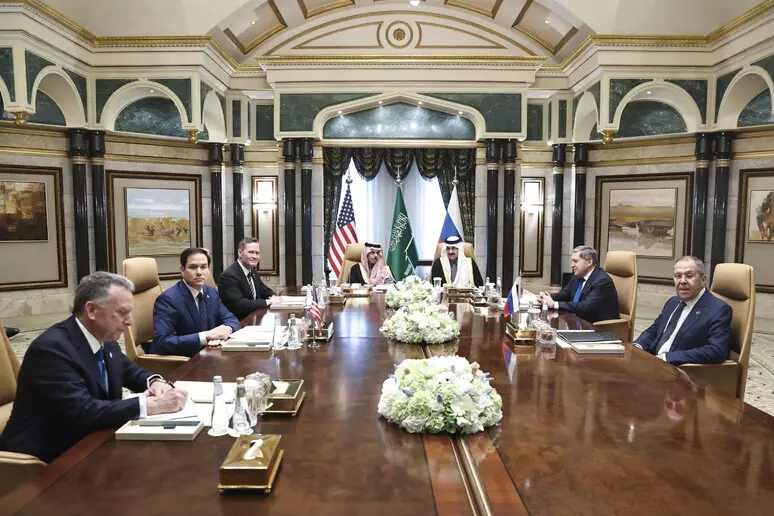The shift in U.S. policy towards Moscow marks a significant change. For three years, Europe and Washington shared a common stance in supporting Kyiv, providing political, economic, humanitarian, and military aid.
Today, the Trump administration’s approach, which appears to prioritize direct negotiations with Moscow, is excluding European countries from the discussion.
Despite these tensions, Europe will still be called upon to play a crucial role. If a ceasefire is reached, a peacekeeping force will be necessary to ensure stability. European states will have to contribute significantly to this mission. Moreover, the reconstruction of a Ukraine devastated by years of war will require strong EU involvement, both financially and in terms of technical assistance.
This commitment by Brussels will strengthen ties not only with Ukraine but also with the Balkan countries.
In redefining regional balances, Ukraine’s potential accession to the European Union could take center stage.
Even Vladimir Putin has acknowledged this possibility, indirectly signaling its political significance. Ukraine’s EU membership would highlight Europe’s responsibilities in stabilizing the country, making it clear that Ukraine’s future is deeply intertwined with Europe.
The EU accession process is known for its complexity and length. It progresses step by step, carefully assessing the candidate country’s ability to handle the burdens of full EU membership.
For Ukraine, the path is particularly challenging due to its geopolitical situation and internal struggles.
However, the European Commission’s latest assessments confirm significant progress in the necessary reforms.
The country seems to be on the right track, a sign that could further accelerate the integration process, always in line with Brussels’ strict conditions.
Despite this progress, the main uncertainty remains Ukraine’s internal political balance. A potential change in Kyiv’s leadership, with the rise of a government less favorable to European integration, could call into question the current trajectory, requiring a reassessment of the country’s prospects in the coming years.
What remains certain is that the European Union continues to exert a strong appeal. The willingness of geographically and politically European nations, though still outside the EU, to move closer to Brussels demonstrates that the European project remains a major point of reference.
Membership is not only seen as an alignment with Western values but also as an opportunity for economic development, growth, and democratic stability.
This attraction is evident in candidate countries such as Albania, Bosnia and Herzegovina, North Macedonia, Montenegro, Moldova, and Serbia. In December 2022, Kosovo submitted its application for membership, adding another dimension to the region’s European ambitions.
Conversely, negotiations with Turkey remain stalled, while Georgia has unilaterally suspended its accession process.
Each country has a unique history and is at different stages of its journey. Often, domestic political developments intertwine with international influences and shifts in geopolitical balances.
The Western Balkans deserve a separate discussion. Albania and Montenegro are the closest to joining the EU, while Serbia remains at a standstill, and Bosnia and Herzegovina and Kosovo are the farthest from accession. Specifically, Serbia has been in accession talks since 2014, but today, it is the most skeptical country in the region about the process.
As in the past, the primary goal remains to ensure stability, economic growth, and the strengthening of democratic institutions in this part of Europe as well.
The commitment made by the European Union at the 2003 Thessaloniki European Council to guarantee a membership perspective to the Western Balkan countries has largely remained unfulfilled, despite more than twenty years having passed. Even with clear strategic interests in favor of their integration, the enlargement process has significantly slowed down due to both internal and external factors.
On one hand, the numerous crises that have hit the EU in recent years such as the economic crisis, Brexit, the pandemic, and geopolitical tensions have dominated the political agenda, creating a sense of fatigue toward enlargement and slowing down negotiation progress. On the other, candidate countries have faced significant challenges in implementing the necessary reforms to meet membership criteria, further delaying the process. For example, in Bosnia and Herzegovina, internal political divisions prevent the implementation of essential reforms, while in Kosovo, rule-of-law challenges pose significant obstacles.
Everything changed with Russia’s invasion of Ukraine in 2022. The European Commission realized that, to maintain its relevance as a geopolitical actor, the most powerful tool at its disposal is enlargement. As a result, discussions on this topic have regained momentum, involving both the Western Balkans and Eastern Europe.
This new perspective creates opportunities but also forces the EU to reconsider its decision-making mechanisms. Some EU countries have already made it clear that, before any further enlargement, the principle of unanimous voting in the EU Council must be abolished. While this principle ensures equality among member states, it can become a major obstacle to decision-making, paralyzing the institution when seeking a unified response to urgent moments of crisis.
Reformers are seeking to improve the efficiency of policies within the EU and expediting its functions, ensuring a smooth and sustainable integration process. This would also allow new member states to adapt and actively contribute to the European project.












